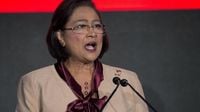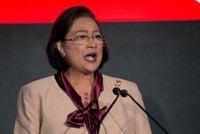On September 3, 2025, the usually tranquil waters off the southern Caribbean erupted into the center of an international firestorm after a U.S. naval strike targeted a boat suspected of carrying drugs. The incident, which resulted in the deaths of 11 people aboard a vessel that had departed Venezuela, has drawn sharp praise, pointed criticism, and anxious calls for dialogue from across the region.
Trinidad and Tobago’s Prime Minister Kamla Persad-Bissessar did not mince words in her response. In a statement released late Tuesday, she declared, “I, along with most of the country, am happy that the U.S. naval deployment is having success in their mission. The pain and suffering the cartels have inflicted on our nation is immense. I have no sympathy for traffickers; the U.S. military should kill them all violently.” According to the Associated Press, Persad-Bissessar’s comments reflect the deep wounds left by years of cartel-driven violence, addiction, and loss within her country.
The U.S. government, for its part, has stood by the operation. President Donald Trump announced that the strike had killed 11 people aboard the boat, which had set out from Venezuela and was intercepted near Trinidad and Tobago. U.S. Secretary of State Marco Rubio explained that the drugs on board were likely destined for Trinidad, or possibly other Caribbean locations, underscoring the region’s role as a major transit point for illicit narcotics.
Persad-Bissessar’s endorsement of the lethal strike comes at a time when Trinidad and Tobago is grappling with surging violence linked to illegal guns, drugs, and human trafficking. The government has imposed two states of emergency in recent months, a testament to the gravity of the crisis. “Our country has been ravaged by bloody violence and addiction because of the greed of the cartels,” Persad-Bissessar stated. “The slaughter of our people is fueled by evil cartel traffickers.”
Yet, not all voices in the Caribbean chorus have sung in unison. Barbadian Foreign Minister Kerrie Symmonds adopted a far more cautious tone. Speaking to the Associated Press, Symmonds revealed that members of Caricom, the regional trade bloc, had sent a letter to Secretary Rubio seeking open lines of communication regarding future U.S. actions, particularly those involving Venezuela. “What we want really...is a structure where we would be able to have shared information affecting U.S. assets in the region, establishing channels of communication and, importantly where possible, some consultation to maintain practical cooperation for continued mutual confidence and avoidance of misunderstandings,” Symmonds said.
For Symmonds and other Caribbean leaders, the goal is to maintain the region’s cherished status as a “zone of peace.” He suggested that, depending on Rubio’s response, both sides could arrange a face-to-face meeting to discuss these concerns. “What effectively we are trying to do is to work through the diplomatic channels of making sure that there are no surprises,” Symmonds added.
The U.S. strike, however, has not only sparked diplomatic maneuvering but also ignited fierce debate over the ethics and legality of such operations. Colombian President Gustavo Petro, writing on X (formerly Twitter), was unequivocal in his condemnation. He argued that maritime interdiction of drug shipments can be achieved without lethal force. “Bombing the boat violates the universal principle of proportionality of force and results in murder,” Petro wrote, highlighting that those transporting the drugs are often “very poor young people” rather than the kingpins orchestrating the trade.
Human rights advocates have echoed these concerns. Juanita Goebertus, Americas director at Human Rights Watch, acknowledged the grave threat posed by organized crime in Latin America but insisted that governments must strengthen their judicial systems to dismantle such groups lawfully. “If the circumstances around this strike are exactly as the administration describes them, it would amount to an extrajudicial execution, prohibited under international law,” Goebertus warned, as reported by the Associated Press.
At the heart of the incident lies the shadowy presence of the Venezuelan gang Tren de Aragua. President Trump has stated that the vessel targeted in international waters was operated by this gang, which Trinidad and Tobago officially designated as a terrorist organization in July 2025. This designation empowers authorities to freeze any assets or property controlled by the group and underscores the seriousness with which the government views the threat.
Tren de Aragua’s footprint in Trinidad is significant but, according to a high-ranking police official cited by the Associated Press, remains relatively small compared to local gangs. The gang’s operations are concentrated mainly in central and east Trinidad, and they are involved in drug, weapons, and human trafficking. Their movements are difficult to track, with members frequently entering and leaving the country illegally, making it nearly impossible for authorities to estimate their numbers accurately. “They deal mostly in drug, weapons and human trafficking,” the official explained, noting that the group tends to avoid staying in any one area for long.
The U.S. operation comes on the heels of an August 2025 announcement to increase maritime forces off Venezuela, a move aimed squarely at combating the influence of Latin American drug cartels. Secretary Rubio has defended the strike and issued a stern warning: such operations “will happen again.” The United States’ willingness to use force in the region is, at least for now, unwavering.
But the fallout from the strike continues to ripple outward. For Persad-Bissessar and many in Trinidad and Tobago, the U.S. show of force offers a measure of relief from the relentless violence that has plagued their communities. For others, such as President Petro and human rights advocates, the operation raises troubling questions about the rule of law, proportionality, and the risk of innocent lives lost in the crossfire.
As the Caribbean navigates these turbulent waters, regional leaders are left to balance the urgent need for security with the equally pressing imperative to uphold international legal norms and human rights. The debate is far from settled, and with the U.S. signaling its intent to continue such operations, the region’s leaders—and its people—will be watching closely to see what comes next.
The events of September 3 have laid bare the complexities and contradictions at the heart of the Caribbean’s fight against drug trafficking. As calls for collaboration, restraint, and justice echo across the islands, the world is reminded that the struggle against organized crime is as much about principles as it is about power.



